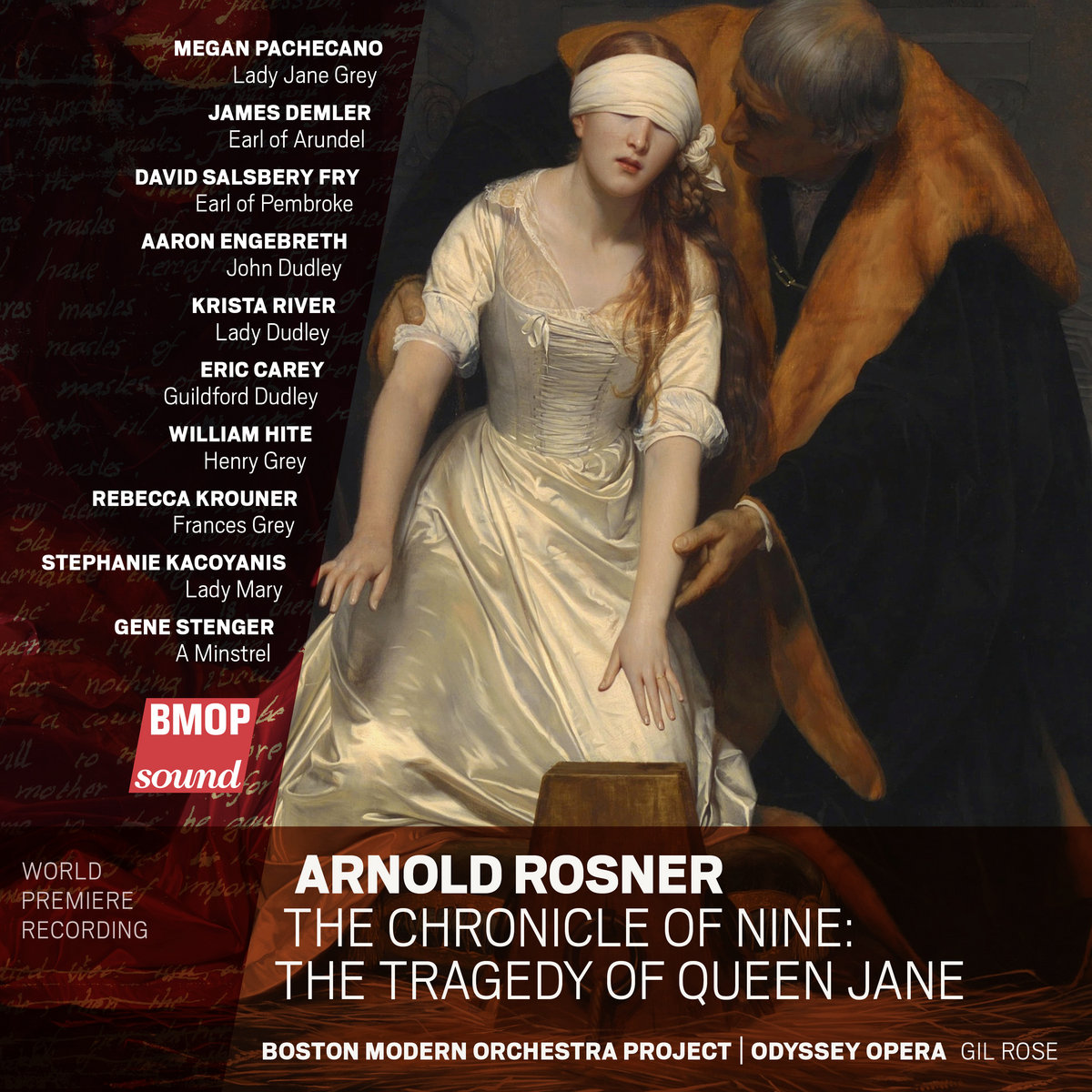
ROSNER: The Chronicle of Nine -- The Tragedy of Queen Jane (1984).
Megan Pachecano (soprano, Lady Jane Grey); James Demler (baritone, Earl
of Arundel); David Salbery Fry (bass, Earl of Pembroke); Aaron Engelbreth
(baritone, John Dudley); Krista River (mezzo, Lady Dudley); Eric Carey
(tenor, Guildford Dudley); William Hite (tenor, Henry Grey); Rebecca
Krouner (contralto, Frances Grey); Stephanie Kacoyanis (contralto, Lady
Mary); Gene Stenger (tenor, Minstrel); Odyssey Opera; Boston Modern Orchestra
Project/Gil Rose.
BMOP/sound 1081 (2 disks) TT: 81:36 + 49:42.
BUY FROM BMOP
Monumental, unfortunately. American composer Arnold Rosner's career suffered
from mainly two things. First, his idiom was out of joint with the prevailing
post-Webernian serialism and avant-gardism of the time. Second (and related
to the first), he had few connections to those musical circles that would
have led
to big commissions and performances. Against this, however, he also had a burning
conviction -- largely clear-eyed -- that he was a great composer. I agree with
him. At his considerable best, which was often, he turned out masterpieces
-- chamber, orchestral, choral, vocal -- and the best thing about them
is that,
despite their considerable compositional complexity, they speak directly to
listeners. I often wonder what the premiere audience at Bartók's Concerto for Orchestra
felt. That score became an instant classic. Those feelings stirred in me when
I heard the majority of Rosner's recorded output for the first time. He has almost
everything I want. The music takes big, epic strides. The ideas and their development
speak directly. The "narrative" proceeds clearly. The idiom, though
eclectic, in toto belongs to Rosner alone, as Mahler assimilated Wagner, Bruckner,
Brahms, the German Lied tradition, and folk song to forge something instantly
recognizable and unique. Rosner takes big aesthetic risks.
At the same time, I recognize Rosner's limitations. He gravitated toward the
grand, even the grandiose. One meets with few "light" pieces, although
they sparkle with wit and good humor. He could write them, but his artistic
sensibility resonated more with rarified emotional heights. He began an opera
on Bergman's
The Seventh Seal, writing a good deal of music before Bergman denied him permission
to use the script.
In the wake of Bergman's shutdown, Rosner cast about for another subject, suitable
for the grand opera he wanted to write. He found one in a modern verse drama
by Florence Stevenson on the nine-day reign of Lady Jane Grey, which (with
Stevenson's permission) Rosner adapted to a libretto. The story concerns the
bloody Tudor
politics following the death of the boy-king Edward VI, Henry VIII's heir.
Jane Grey, a teen herself, is pressured into a marriage with the powerful Dudley
family.
That faction proclaims her Edward's lawful successor. Unfortunately, they have
little popular support and Jane is deposed in favor of Mary Tudor (known as "Bloody
Mary" for her persecution of Protestants; she was, of course, Catholic).
It wasn't a matter of religion for most of the English, but the fact that they
regarded Mary as next in the rightful line of succession. Mary imprisoned Jane
and her husband and executed them both, along with the other major players
of the Dudley faction. It took Rosner four years to finish this, his longest
score.
Most composers fall into either the lyric or the dramatic category. The
lyric composer directly expresses emotions. The dramatic composer creates
characters
and emotions rise from conflicting points of view. It is the difference between
a Keats sonnet and a Chekhov play. Mozart could do both. The Symphony No. 40,
while turbulent, is lyrical. The Marriage of Figaro and Don Giovanni -- although
both contain beautiful arias -- not only depict character but provide a variety
of pace that moves the action along. Rosner, despite the "drama" in
his instrumental music, remains a lyric composer, not a dramatic one. His musical
methods don't really suit the theater.
Nor does Lady Jane make a strong heroine. Historically and dramatically,
she has little agency, essentially a cat's-paw for the bigger players.
That's not
necessarily a bad thing, if you can breath life into the intrigue. This Rosner
fails to do. Each scene moves at roughly the same slow, steady pace. The musical
variety comes from instrumental interludes and preludes. Furthermore, each
character sounds like every other. Dramatically, the opera fizzles out. This
doesn't mean
it lacks effective moments, like Jane's prayer (Act I, scene ii), the love
duet in the Tower between Jane and her husband (Act III, scene ii), the powerful
final
scene of Jane's execution, or any of the instrumental pieces, but these again
are essentially lyric, not dramatic. It's a bit like watching a pageant, rather
than a play.
I should add that Rosner succeeded in his short opera, Bontsche Schweig
(based on a short story by I. L. Peretz, never commercially recorded),
mainly because
it's brief and because the nature of the original story is more ritual than
drama. Rosner never heard this score as a fully staged production. He did extract
bits as suite and reworked much of the music into his Seventh Symphony, and
both appeared
on CD. Kudos to the Boston Modern Orchestra Project and Odyssey Opera under
the direction of Gil Rose for championing a score which, even now, has very
little
chance of a path in the "normal" opera world. The notes, by Walter
Simmons and Carlton Cooman, and the sonics are first-rate. Although I think
it a weak opera, it still contains marvelous music. Rosner can still get to
you.
S.G.S. (April 2022)